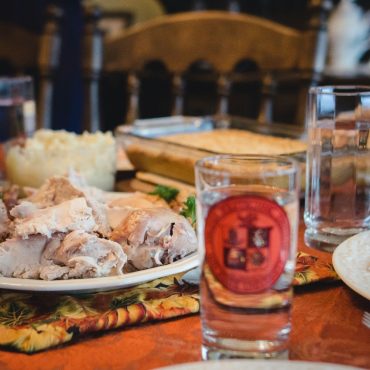
David said, “I won’t offer an entirely burned offering that costs me nothing” (1 Chronicles 21:24). He insisted on paying for what he would sacrifice to God. What does it mean to “sacrifice”?
Scripture:
2 Samuel, chapter 24; 1 Chronicles, chapter 21; Psalm 30; 1 Thessalonians, chapter 2
1 Chronicles 21:18-27 (CEB):
The Lord’s messenger ordered Gad to tell David that he should go up to the threshing floor of Ornan the Jebusite in order to set up an altar for the Lord. So David went up, following the instructions Gad had delivered in the Lord’s name. Ornan turned around and saw the king. His four sons who were with him hid themselves, but Ornan continued threshing wheat. When David approached Ornan, Ornan looked up, recognized David, left the threshing floor, and bowed to David with his face to the ground. David said to Ornan, “Give me the site of the threshing floor, charging full price, so that I may build an altar to the Lord, and the plague among the people may come to an end.”
Ornan replied to David, “Take it for yourself, and may my master the king do what he thinks is best. I’ll even provide the oxen for the entirely burned offerings, the threshing boards for wood, and the wheat for the grain offering – I’ll provide everything!”
But King David said to Ornan, “No, I will buy them from you at a fair price. I won’t offer to the Lord what belongs to you nor offer an entirely burned offering that costs me nothing.” Then David gave Ornan six hundred shekels of gold by weight for the site. David built an altar there for the Lord and offered entirely burned offerings and well-being sacrifices. He called on the Lord, who answered him with fire from heaven on the altar of the entirely burned offering, consuming the entirely burned offering. Then the Lord commanded his messenger to return his sword to its sheath.
Observations – What Does It Mean to Sacrifice?
David’s Census
The first part of this chapter tells us about the census of Israel that David ordered. (Our reading from 2 Samuel for today tells the same story in a slightly different way). The two accounts are confusing. In 2 Samuel, it says that the Lord incited David to take the census (see 2 Samuel 24:1). In 1 Chronicles it says that “a heavenly adversary” incited David to take the census. (The Hebrew word for “adversary” is satan.) How do we reconcile these accounts?
I view them this way: the writers of 2 Samuel didn’t want to attribute anything bad to David, so they said that the Lord had incited David to take the census. But does it seem consistent with God’s character for him to “incite” David to do something, and then punish Israel for David having done it? The writers of 1 Chronicles, on the other hand, would not impugn God’s character by saying that God had incited David to do something wrong, so they said that “an adversary” had done it.
In either case, God reacted. First Chronicles 21:7 says, “God was offended by this census and punished Israel.” God gave David the choice of punishment: three years of famine, three months of attacks by Israel’s enemies, or three days of a plague. David chose the plague, because he trusted in God’s mercy. “I’d rather fall into the hands of the Lord, who is very merciful; don’t let me fall into human hands” (1 Chronicles 21:13). And that’s what happened.
David’s Sacrifice
After the plague was halted, God sent word to David to build an altar for sacrifice at the threshing floor of Ornan. So David went to Ornan’s property and asked Ornan to sell the property to him. Ornan offered to give David the property, to do whatever he thought best. In fact, he also offered to give David the oxen for the sacrifice, the wood for the fire, and the wheat for the grain offering to go with it.
But David refused. “No, I will buy them from you at a fair price. I won’t offer to the Lord what belongs to you nor offer an entirely burned offering that costs me nothing” (verse 24).
Application – What Does It Mean to Sacrifice?
How many of us in David’s position would have gladly accepted Ornan’s offer? We would probably justify it by saying that God had blessed us by providing what we needed at no cost to us! But that attitude is completely contrary to the idea of “sacrifice.” The word “sacrifice” means “the surrender or destruction of something prized or valuable for the sake of something considered as having a higher or more pressing claim” (dictionary.com). The fact is that if Ornan had given all these things to David, it would not have been a “sacrifice” for David at all. David recognized that the core of sacrifice is that it costs something. ”I won’t offer to the Lord what belongs to you nor offer an entirely burned offering that costs me nothing.”
In Romans 12, Paul urges us “to present your bodies as a living sacrifice that is holy and pleasing to God” (Romans 12:1). Offering ourselves as “living sacrifices” means that we are completely surrendered to God.” “The surrender or destruction of something prized or desirable for the sake of something considered as having a higher or more pressing claim.” We offer ourselves to God as living sacrifices “because of God’s mercies” (Romans 12:1). Paul gives a further justification for our self-offering at the end of chapter 11: “All things are from him and through him and for him” (Romans 11:36). Whatever we have and whatever we are is because of God!
But while “the earth is the Lord’s, and everything in it, the world and its inhabitants too” (Psalm 24:1), God has given us a degree of self-sovereignty. He does not force us to offer ourselves to him, because he wants us to choose to do so. Our sacrifice is to surrender ourselves to God because his claim on us is higher than our claim on ourselves. As we offer ourselves to God, we offer him all that we have – because what he has done for us makes his claim far greater than our own.
Prayer:
Father, thank you for the gift of life that you offer us through Jesus’s death and resurrection. As Paul says in 1 Corinthians 6, we have been bought at a price. Jesus paid the price; your claim over us is greater than our own. At the end of the day, all we have to offer you is ourselves. Anything that we might have obtained or achieved will pass away with us; only the treasures that we store up in heaven will last.
Thank you for reminding us that sacrifice means that we offer something of value. Help us not to offer you our left-overs, the stuff we no longer need nor want. You deserve the very best – the surrender of something prized or desirable – because of what you have done for us. Bless us today with your presence and your peace as we offer ourselves as living sacrifices to you. Amen.


















Post comments (0)